|
|
|
Sort Order |
|
|
|
Items / Page
|
|
|
|
|
|
|
| Srl | Item |
| 1 |
ID:
187045
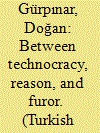

|
|
|
|
|
| Summary/Abstract |
This article aims to demonstrate the tension inherent within the Turkish opposition between those favoring technocratic anti-populism and/or pragmatic politics and those calling for a passionate and resolute anti-AKP platform seeking revenge. These competing inclinations offer alternate anti-populist platforms and ‘styles.’ The article asks whehter opposition to a populist regime inherently generates an anti-populist platform that ideologically confronts it. The article examines three contenders to President Erdoğan as representatives of three alternative anti-populist styles. It also reflects on the debates among various public intellectuals around the ways to electorally defeat populism.
|
|
|
|
|
|
|
|
|
|
|
|
|
|
|
|
| 2 |
ID:
187047
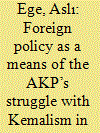

|
|
|
|
|
| Summary/Abstract |
This article provides analyses as to how foreign policy affects domestic politics, in particular the AKP’s struggle with Kemalism. It examines how Kemalism was delegitimized through the initial democratic, pro-European Union and pro-West discourse of the AKP. It then analyzes Kemalism’s marginalization under the civilizational, neo-Ottoman discourse advanced by Ahmet Davutoğlu. Finally, it explores Kemalism’s alienation through the opposition CHP, which has been impacted by the neo-Ottoman discourse, as currently constructed. It concludes that the AKP’s struggle with Kemalism did not end even when it established control over the state and when the ideological Kemalist nation-state identity was replaced by a new content in the form of an Ottoman-Islamic civilization. The article relies on a method of interpretative analysis of the AKP and Kemalist movements.
|
|
|
|
|
|
|
|
|
|
|
|
|
|
|
|
| 3 |
ID:
187046
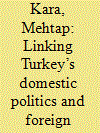

|
|
|
|
|
| Summary/Abstract |
This article examines Turkish domestic politics and the country’s foreign policy behaviors under the ruling Justice and Development Party (AKP), using Joe Hagan’s three alternative political strategies: accommodation, insulation, and mobilization. The first AKP administration used an accommodation strategy to avoid confrontations with military and judiciary institutions, resulting in restrained foreign policymaking. During its second tenure, the AKP leadership successfully insulated domestic opposition, allowing for implementation of a new foreign policy agenda. In the post-failed coup period, to discredit domestic adversaries, unify the public, legitimize leadership positions, and demonstrate a capacity for maintaining the nation’s security, the AKP has adopted a mobilization strategy and manipulated Turkish foreign policy through a ‘diversionary war’ in Syria and periodically escalated tensions in the Eastern Mediterranean region. This strategy has helped contain domestic opposition, while diverting public attention from divisive domestic problems to Turkish military activities abroad.
|
|
|
|
|
|
|
|
|
|
|
|
|
|
|
|
| 4 |
ID:
187048
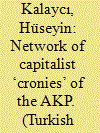

|
|
|
|
|
| Summary/Abstract |
The upgrading of Başakşehir from a quarter to a district is related to the transformation of İstanbul Başakşehir Football Club from a football club into a politico-cultural project carried out capitalist cronies attached to the governing (Justice and Development Party). ‘Rent-seeking’ activities in cultural areas are usually neglected or, if anything, considered the indirect results of developments in the financial or economic field. Sports in general and football in particular are the best examples of this omission. This article is directed towards filling this gap by taking Başakşehirspor as a venue to explore how ‘rent-seeking relations’ expand and gain a foothold in culturally-oriented economic fields in order to bolster their already established control over networks of cronies in the political and economic system. In the literature, a common characteristic of crony capitalism, network formation, has not received sufficient attention. The available research, focusing on whether crony capitalism merely replaces corruption, clientelism, or both, overlooks certain kinds of methodological approaches that could be fruitful, such as network analysis. An analysis of how this network revolves around Başakşehir and of its transformation under AKP governance will provide a basis to show how Başakşehirspor replicates the same practices of network formation.
|
|
|
|
|
|
|
|
|
|
|
|
|
|
|
|
| 5 |
ID:
187049
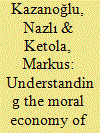

|
|
|
|
|
| Summary/Abstract |
The implementation of neoliberal welfare frameworks since the ascendancy of the Justice and Development Party in 2002 has led to a fundamental reorientation of the state-civil society relationship, where non-governmental organizations (NGOs) have been given wide-reaching roles in the delivery of welfare. In the field of family policy, the NGOs benefitting from such policies are largely faith-based organizations with close relationships with the AKP government. Based on interviews with Turkish women’s NGOs (WNGOs), this article studies the intersections of gender, family, civil society, and the state to shed light on the development of contemporary welfare policy in Turkey.
|
|
|
|
|
|
|
|
|
|
|
|
|
|
|
|
|
|
|
|
|